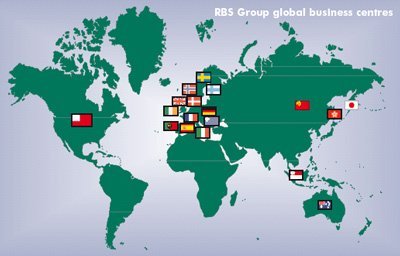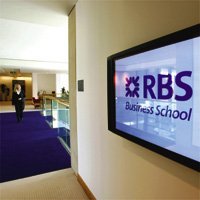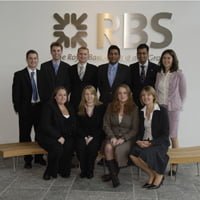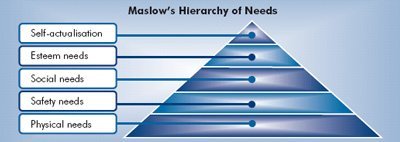
RBS is one of the world’s leading financial services companies providing a range of retail and corporate banking, financial markets, consumer finance, insurance, and wealth management services. It serves more than 36 million customers world-wide and employs more than 140,000 people.
In addition to the provision of a full range of banking services under The Royal Bank of Scotland and NatWest brands, RBS also includes Citizens Financial Group, Ulster Bank Group, Coutts, Direct Line, Churchill and around 40 other brands. As a global business its operations are diverse. For example, in 2005, it bought a share in the Bank of China, China’s second largest bank, opening up new opportunities such as a new credit card business.

Roles at RBS
Due to its scale and diverse range of businesses, RBS has lots of different career opportunities to offer. These include bankers, traders, sales, customer service, investment analysts, and business advisors. There are also business support roles such as IT, marketing, human resources, finance, and legal. Careers can start directly after leaving school on an apprenticeship programme or from university on a graduate development programme.
Performance management
At RBS almost every role can be described in terms of specific job targets. This method of performance management allows managers to measure each individual’s performance in a specific way and reward them accordingly. RBS employees will agree job objectives and targets with their line manager at the beginning of the year. Their performance is then measured and reported on during the year. At the end of the year they will have a performance review. Payments for results are an effective motivator for high performance.
Some jobs are paid according to the achievement of targeted results. This means that a bonus is paid if the employee achieves agreed targets for the job. For example, a corporate banker has responsibility for gaining a certain number of new business customers each year. If the target is achieved or exceeded she/he will get a bonus payment. Particularly challenging or difficult to achieve targets are known as ‘stretch targets’ and the reward for achieving these will be greater.

Herzberg and ‘two-factor’ theory
Another theorist, Frederick Herzberg (1959), carried out a large-scale survey into motivation in American industry. The results of his survey led him to develop a ‘two-factor’ theory of motivation. Firstly, he established that if an employee’s basic needs (such as a suitable working environment and a basic rate of pay) were not met, then this creates a source of dissatisfaction. Herzberg termed these ‘hygiene factors’. On the other hand, the presence of less tangible factors, such as the provision of challenging work and recognition for doing well, can create or increase work motivation. Herzberg termed these ‘motivators’.
RBS has put in place several of Herzberg’s ‘motivators’:
- employees get recognition for good work
- they have a collective sense of achievement when the whole business does well
- they gain extra responsibility and advancement through regular performance reviews
- when RBS people do well in their work, the company rewards them.
Maslow’s Hierarchy of Needs

According to Maslow, the most basic needs on this hierarchy had to be satisfied before workers could look to the next level. Basic physical needs were things like shelter, food, warmth and bodily functions. Next, people had to feel safe in their environment. RBS provides these basic needs wherever it creates jobs.
Maslow’s higher levels of need are less obvious and less easy to describe but of great importance. Social needs refer to the fact that we want to feel part of something we share in. RBS creates the opportunity for its community of employees worldwide to share in its common goals and vision for the group. It does this by rewarding the people who contribute to its success through their commitment and hard work.
RBS provides ‘self actualisation’ by offering recognition, promotion opportunities and the chance to develop a lifelong career with the Group.
The next level ‘esteem’ – refers to our need to feel valued, that what we do matters. The RBS mindset is that employees can ‘make it happen’ for themselves. It provides opportunities for all employees through promotion or training and then recognises their achievements. Through this RBS employees can improve their self-esteem. At the very top of Maslow’s hierarchy is our human need for ‘self actualisation’. This means we work hard in order to be as good as we possibly can be. RBS meets this by offering recognition, promotion opportunities and the chance to develop a lifelong career with the Group.

The RBS Total Reward package also offers flexible pension funding, health and medical benefits, paid holidays, and confidential advice services. Employees have a generous holiday allowance (between 25 and 30 days for full-time staff), with the option of buying or even selling days. Employees may also choose from a wide range of lifestyle benefits, including discounted shopping vouchers, childcare facilities and RBS financial products, such as mortgages, currency exchange, personal loans and banking at special staff discounted rates.
Results Based Payments
At the core of the package is a competitive salary based on skills and experience regardless of where in the world RBS staff are based. Providing competitive pay means comparing what you are offering against salaries for similar jobs in other financial services companies. All staff receive their salary credited monthly to their staff bank account. The terms and conditions of their employment specify the basic rate of pay and any further payments that they may be eligible to receive.
However, within RBS the basic salary is only the starting point from which a number of additional bonus payments can be earned. All employees share in RBS’ success through its profit sharing scheme. If the company meets its overall profit targets, then all employees will receive a bonus worth 10% of their salary. On top of the profit-share bonus, as mentioned before, there is also the chance to earn an individual performance-related bonus when employees achieve or exceed their personal performance targets, for example, a project manager who delivers the project ahead of time and within budget. So in a year when the company does well and the individual performs well, the additional payments may be quite substantial.
Non-Financial Rewards

One of the most important motivators for RBS employees is the recognition of good performance by graded progression. At RBS, people are encouraged to ‘make it happen’ through personal development. This means RBS encourages employees to grow and develop their skills and abilities. This in turn helps RBS to grow as a company. Employees identify development needs with their line manager at their annual performance review. These are documented in a personal development plan. Development can involve more training, attending courses or gaining new understanding and skills. This can improve the prospects of promotion and allow employees to move up the organisation and increase their Total Reward.
RBS also believes in giving its people the chance to help put something back into their own communities. Wherever RBS operates, the Group supports community involvement in projects that matter to its people. For every pound raised for charity by a member of staff, RBS will double-match the donation, making every pound raised count three times.
In the last year, groups of RBS employees have supported many fundraising projects for local communities and charities. These have included:
- a ‘pirate kidnap’ in South Wales for a youth charity
- taking part in the Microsoft UK Challenge for the NSPCC
- cycling across the Himalayas for British Wheelchair Sport.
The RBS Group also contributes to various projects throughout the UK to improve communities and the lives of the people involved. For example, over the last two years, it has provided funding and advice to:
- the regeneration programme of a housing estate in Scotland. This won a national award for including the local residents
- the development of a hospital in Portsmouth and four schools across the country
- the provision of free-access cash machines in deprived areas in Scotland
- the setting up of school banks where students manage the banks themselves to learn a practical approach to numeracy and personal finance.
To attract and retain the highest qualified and motivated employees, RBS enables its employees to develop a work-life balance between work and non-work commitments.
Flexible working

RBS and ‘Your time’
RBS recognises that in some circumstances, people may need time off from work for reasons other than sickness. Some people have special family commitments or commitments in their local community. In 2004, the RBS ´Your time´? programmes won the HR Excellence Award for ‘The Most Effective Use of Flexibility in the Workplace´?.
The benefits of flexible working practices
The policies of RBS in relation to work-life balance help to create a working atmosphere that relieves stress. They also help to create greater equality of opportunity for everyone. For example, this flexibility enables employees to choose working patterns that fit with their childcare arrangements or their personal lives.
Following these flexible practices allows RBS to attract more talented people. Theoretical work on motivation by Elton Mayo in the 1920s showed that contented people, who are satisfied with their working environment, were likely to be more productive. The distractions of home or community pressures can be handled far more comfortably with the support of an employer such as RBS. In return, RBS gains staff loyalty and commitment, which in turn drives higher performance.
RBS operates an exciting and forward thinking Human Resources (HR) strategy. It provides a world-class employment package for every employee, at every level, wherever they work. It adopts an attitude that motivates its staff in both financial and personal ways. By doing this, RBS is able to compete for the best people and attract them to its business. In a world where local labour market conditions can fluctuate from region to region, RBS must be sensitive to local conditions and individual needs.
At RBS, motivation theory comes to life. RBS employees at all levels can enjoy a work environment where effort is seen to be valued, where achievement is recognised, where individual progress is rewarded and where a long term career is available for those who are able to grow with the business. Where individuals are made to feel a part of the bigger picture and where the rewards available are varied, practical, personal and tailored to the individual, there are motivators for all.
